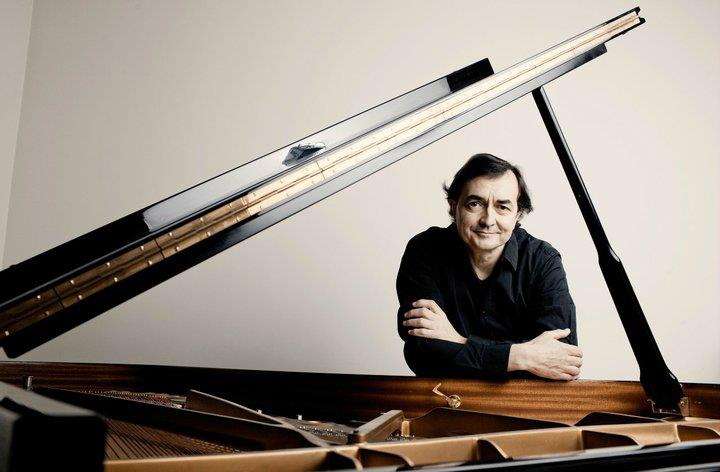|
Back
Quiet Fire Philadelphia
Perelman Theater, Kimmel Center
11/13/2012 -
Heinz Holliger: Three Nocturnes
Robert Schumann: Symphonic Etudes, Op. 13 (incl. Five Symphonic Etudes, Op. post.)
Claude Debussy: Preludes, Book II
Pierre-Laurent Aimard (piano)

P.-L. Aimard (Courtesy of the Artist)
Pianist Pierre-Laurent Aimard was a sensation in his first appearance at the Philadelphia Chamber Music Society in 2010, but he relied on no laurel and almost appeared solemn as he stiffly walked on the Perelman Theater stage earlier this month. Miles Cohen, PCMS’s always dapper publicist announced the play list was switched, with Debussy’s Preludes, Book II changed to the program starter, followed by Schumann’s twelve Symphonic Etudes. Mr. Aimard didn’t give a clue why as he sat unceremoniously at the piano. Perhaps it was mood, or the molecules in the air or attributed to his laser - beam musicianship.
He played both pieces without a score in front of him and it was indeed a triumphant sense of music occasion, and there were so many discoveries for listeners, especially with the episodic, determinedly unbeatified Debussy. He floated in the opening Brouillards (“Mists”) and this crystal stream continued to bathe the concert hall. One quality throughout, a translucent chromatic pulse of Debussy, sometimes easily disappeared, without notice or musical impunity.
The Preludes require more than technical clarity, more than virtuosity, and Aimard seemed to bring everything he had as a musician and human into them. Aimard is not a showy pianist, but his whole body is involved with the keyboard, his fingers, weightless quicksilver. The precision, the textures, the stoic drama, the luminous scenes of La puerta del vino, Les fées sont d’exquises danseuses, Feux d’artifice, just to mention a few, conjured with Aimard’s interpretive accents and pristine refinement.
At the end, with the audience lustily applauding, Aimard received the ovation almost formally, with barely a hint of a smile. After a break, he returned with a score in front of him for Heinz Holliger’s Elis, Three Nocturnes for Piano, composed in 1961 and this dark, brooding piece had him sleathly hammering the keyboard in moments. Contrasting the esprit of Debussy, this was a piano noir, complete with a blood curdling slow fade of him reaching in and violently strumming the action.
It was a contrasting, gorgeous prologue to the romantic opening andante in the Schumann. Aimard italicized instances of Beethoven and even baroque elements in the opening sections, giving it the warmest luster. Compared to the Debussy, there was an instance or two of tightness in the denser progressions, but leading into the later Five Symphonic Etudes that he spliced in, Aimard was masterful with the Opus Post (posthumous etudes rescued by Brahms in 1873) inserted between Etude’s VII and VIII. The concluding Allegro brillante, had runaway gallop that brought this audience to their feet and Aimard rather stiffly bowing, but on the third call, he came out sat down with a score and smiled broadly and with such warmth, “One shouldn’t attempt an encore after such a masterpiece. But this is for our beloved Elliot Carter,” he said before playing Carter’s Fratribute in tribute to the composer who had died at age 103 the day before. It was a memorable moment capping off another electrifying performance by Aimard.
ConcertoNet is on Facebook
Twitter: @concertonet
Lewis Whittington
|